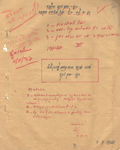|
|
|
 |
DC-Cam is in the process of developing a searchable database of the
documentation it holds. The database, whose document categories are
still being developed, will contain information on:
Khmer Rouge notebooks,
biographies of cadres and prisoners, confessions, reports, and
execution logs.
Our database will employ Microsoft Access or a similar user-friendly
format that will enable quick and accurate searches.
|
The
database will also be an effective way to facilitate our current
program of family tracing, whereby survivors of the Democratic
Kampuchea era can search for information on lost loved ones.
In the
interim interested readers can view three major databases contained in
the
Cambodian Genocide Databases:
-
The
Cambodian Genocide Bibliographic Database (CBIB)
-
The
Cambodian Genocide Biographical Database (CBIO)
-
The
Cambodia Tuol Sleng Image Database (CTS).
These
databases were set up in a collaborative effort by Yale University,
DC-Cam, and the University of New South Wales. They contain detailed
information on former Khmer Rouge leaders and cadres, and provide an
organized information resource about the Democratic Kampuchea (DK)
regime and many of its victims. Because these databases are
Internet-accessible, scholars, legal personnel for the tribunal (both
the prosecution and defense) and the general public in Cambodia and
abroad can access them.
Please note
that before any of the images from the CTS database can be reproduced,
written permission must be obtained from either DC-Cam (dccam@online.com.kh)
or Tuol Sleng Genocide Museum (sopheara@bigpond.com.kh).
Also, contact DC-Cam to obtain copies of data on CD-Rom or microfilm.
|
|